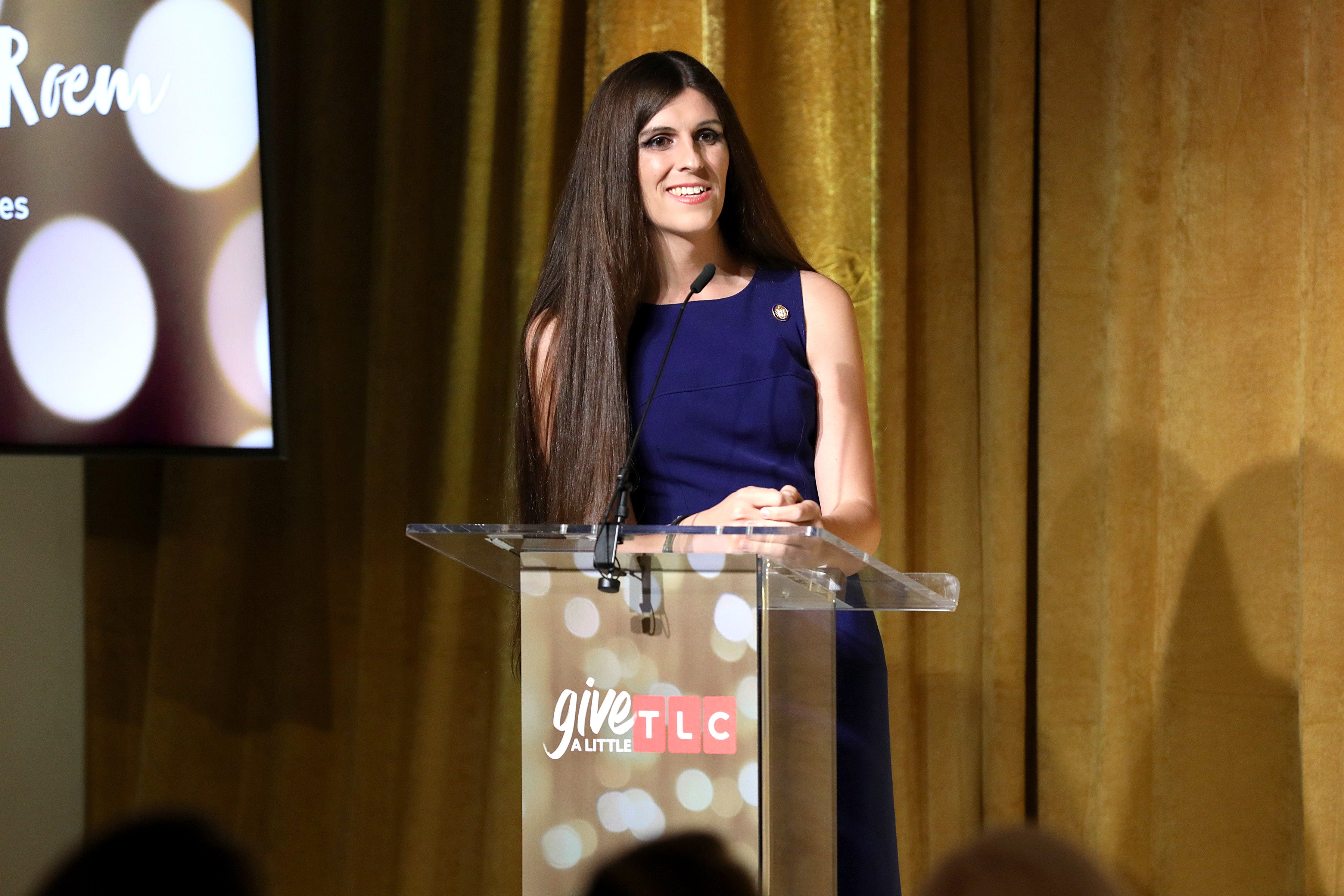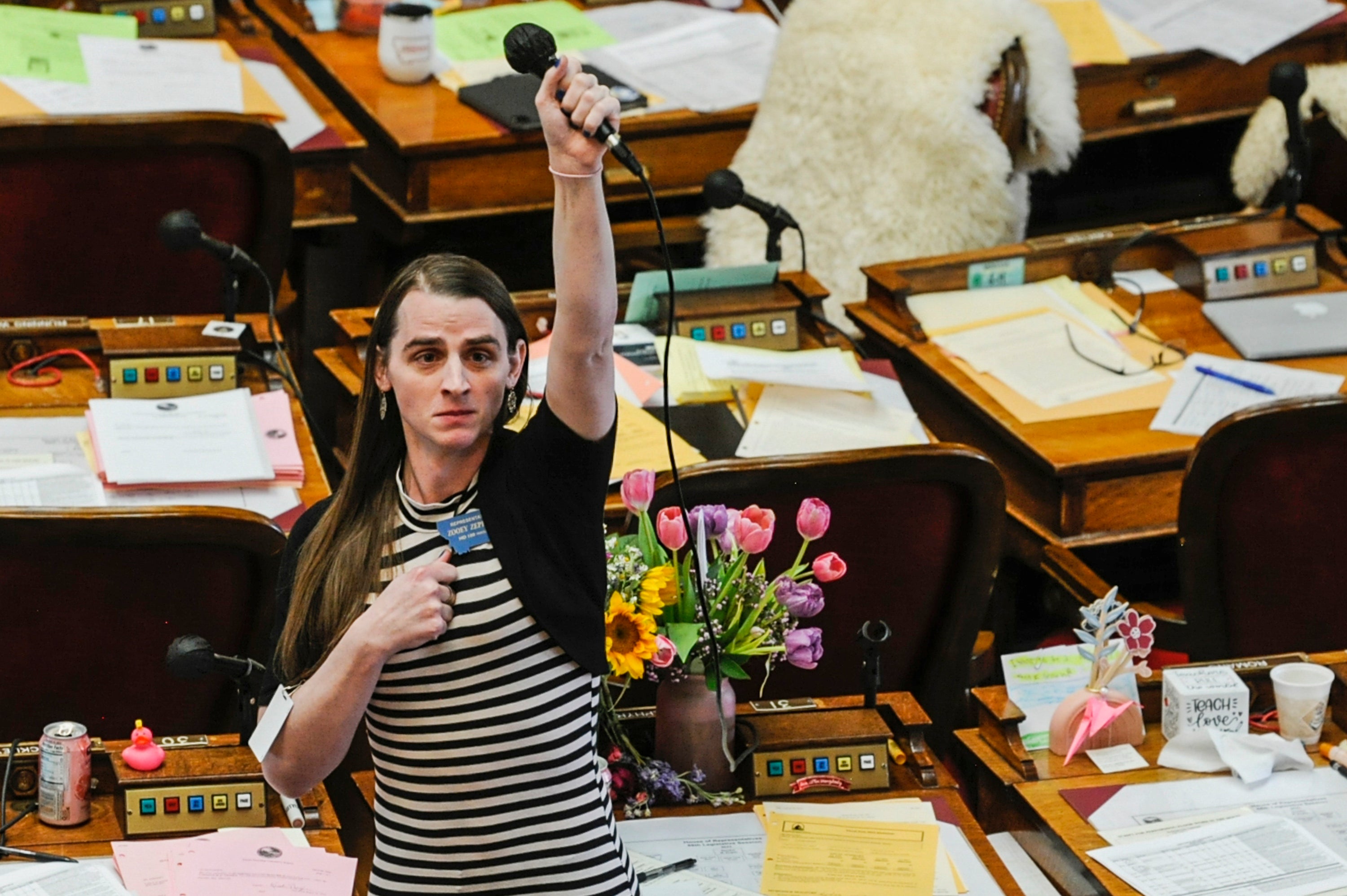Pioneering transgender lawmaker has advice for pushing back against transphobic bills
Danica Roem, the first openly transgender lawmaker to be elected and serve in a state legislature, talks with Eric Garcia about being a voice for transgender Virginians, what Democrats can do to defend trans youth and the future of political representation


The first time I ran into Danica Roem in 2019, I literally bumped into her in a mosh pit at the Fillmore in Silver Spring, Maryland. The former heavy metal musician, journalist and pioneering lawmaker was taking a quick break from running for her second term in the Virginia House of Delegates to enjoy some Swedish metal.
Her years of tussling with fellow headbangers likely primed and prepared her for her days leading the charge to defend the rights of transgender people and LGBT+ people, as a whole as Republicans seek to restrict them in Virginia’s state legislature, where she is currently serving in her third term and is currently seeking a promotion from delegate to state senator.
Speaking to The Independent over the phone four years later, Ms Roem is quick to remind people that she is not the first transgender state legislator, since Althea Garrison served in the state legislature in Massachusetts before she was outed as trans, and Stacie Laughton in New Hampshire was elected in 2012 but didn’t serve until 2020.
Still, as the first openly transgender person to both be elected and serve in a state legislature, she now faces the challenge of fighting to defend the rights of LGBT+ people as her state’s Republican governor and legislature have moved to try and prevent transgender women from participating in women’s sports. And in doing so, she has something many other transgender people do not have as they try to preserve what little dignity society affords them: the power to push back.
“And I know that, when I speak against bills like this on the House floor, that it's not just me that I'm speaking for, and even though I am there to represent my constituents, and that is the reason I am speaking on the floor, above all,” she said.
“I also know that there will be people, across the commonwealth across the country, and in some cases, even around the world, who will be watching what I say, because they're going to be paying attention to the arguments, whether they agree with them or disagree with them, because they're trying to basically learn about the issue and learn how to talk about the issue one way or the other.”
As a result, Ms Roem says that she has to be deliberate in how she approaches her job and the way she achieves her goals is not to approach everything at once.
“Focus on the bill that's in front of you, don't focus on how Twitter is going to react to this,” she said. “Don't focus on how people outside of your district are going to focus, are going to react to this bill, focus on the words and the letters in front of you. Make the case based on the legislation itself.”
Ms Roem said doing so removes the tension and the pressure of having to perform for a global audience.
Her first victory in 2017 came as part of the response to former president Donald Trump’s election. Democrats held onto the governorship and flipped 15 state house seats. In 2019, Democrats flipped the state house and it seemed to signify a shift from Virginia being a purple state to a solidly blue state.
Then in 2021, a massive shift happened. Former Democratic governor Terry McAuliffe lost to Republican businessman Glenn Youngkin and Republicans flipped the House of Delegates. Since taking office, Mr Youngkin has proposed a model policy that would require transgender youth to use bathrooms and facilities that align with the sex they were assigned at birth. The policy would also require that parents approve if a student were to use names or pronouns different from their birth ones.
This often means Ms Roem is on the front lines when it comes to defending the rights of transgender people. A journalist by trade before beginning her political career, she is often fastidious in her questioning.

Recently, she served as a lead questioner for Democrats when Republicans put forward two bills that would have targeted transgender people: one that would have banned transgender girls from participating in women’s and girls’ sports and another that would have outed transgender youth to their parents.
“And so, I pointed out the world of flaws with both of these terms of language,” she said. Ultimately, she noted, the bills were amended after their passage and both bills failed in the Senate. Ms Roem said it shows that for Republican lawmakers, passing these bills is more about pleasing outside interest groups than serving their constituents.
“They were simply trying to get political credit from groups about this, regardless of whether the text that they were proposing was ready to actually undergo thorough scrutiny, it was not,” she said.
Ms Roem is quick to remind people that the Republican Party has often pushed anti-LGBT+ legislation and it has only reverted to form with the recent wave of anti-transgender legislation.
“I had to drive four times to the General Assembly, all the way from Manassas to Richmond, to fight nine anti-LGBTQ bills,” she said. “This is nothing new from the Republican Party in Virginia, this is nothing new at all.”
As of May, more than 145 anti-LGBT+ bills have passed through at least one chamber of a state legislature, according to the Human Rights Campaign. Many deal with the same topics that Ms Roem is dealing with in Virginia, such as restricting gender-affirming care for minors, prohibiting transgender youth from participating in women’s sports, or preventing them from using a bathroom that aligns with their gender identity.
These fights are also being amplified on the national stage. In 2017, when she won her seat in the state house, Joe Biden called her. Mr Biden has in the past called transgender rights the civil rights issue of the modern day. At the same time, in April, the Biden administration announced a Title IX proposal that would prohibit schools from outright banning transgender athletes from playing in sports that align with their gender identity but also would leave room for schools to implement rules that could include exclusions for trans athletes, citing “fairness in competition” and “competitive high school and college athletic environments” where “some schools may adopt policies that limit transgender students’ participation”.
Ms Roem said that Democrats need to make sure that they act quickly when they have power to protect the rights of marginalised groups, noting how in 2009, Democrats had 60 seats in the US Senate and a House majority.

“Sometimes you have to understand that when you're given this opportunity to do something big and to do something important that you have a moment that might not be there long term,” she said. She said that congressional Democrats and the White House should look at states like Michigan and Minnesota that are enacting protections for LGBT+ people. She said that next time Democrats have a trifecta, they should work to pass the Equal Rights Amendment to the Constitution, which she says would protect LGBT+ people. Ms Roem has the text of the amendment tattooed on her arm.
“So I would make the case that they need to go to the mat for the Equal Rights Amendment,” she said.
Despite the challenges that many transgender people face in state legislatures, Ms Roem is no longer alone. In Delaware, Sarah McBride serves as a state senator and is widely considered to be a top contender for Delaware’s sole congressional seat if incumbent Rep Lisa Blunt Rochester (D-DE) runs for the United States Senate.
In Montana, Zooey Zephyr is a transgender state legislator who recently received national attention when Republicans in the legislature barred her from speaking on the House floor.

But Ms Roem says that she knows that all things aside, she is the best person to represent the people in her district, highlighting how 41 bills she sponsored were signed into law.
“You don't have a record like that, because you're just some partisan blowhard who doesn't understand that you have to work with people who disagree with you,” she said. “I come from a Republican household. I am well aware and I will be able to communicate with my Republican colleagues.”
At the same time, she understands the importance of her visibility, saying how she knows what her visibility means to other transgender people, noting how when she kicked off her campaign, a mother showed her transgender daughter who had attempted suicide the story.
“Today, she's a 16-year-old happy kid,” she said.
“My job was just to be first, my job wasn't to be the only first,” she said, noting how Ms McBride got to a first for the community.
“She's the first out trans state senator, and hopefully, she'll be the first out member of Congress,” she said. “Great. Cool. I don't need that. Other people should have firsts too.”
Join our commenting forum
Join thought-provoking conversations, follow other Independent readers and see their replies
Comments


Bookmark popover
Removed from bookmarks